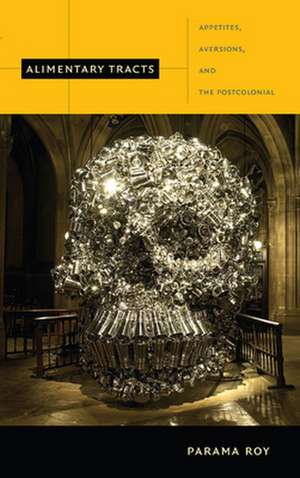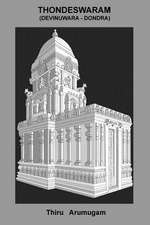Alimentary Tracts – Appetites, Aversions, and the Postcolonial: Next Wave: New Directions in Women's Studies
Autor Parama Royen Limba Engleză Paperback – 7 noi 2010
Din seria Next Wave: New Directions in Women's Studies
-
 Preț: 166.70 lei
Preț: 166.70 lei -
 Preț: 166.70 lei
Preț: 166.70 lei -
 Preț: 158.45 lei
Preț: 158.45 lei -
 Preț: 193.83 lei
Preț: 193.83 lei -
 Preț: 218.88 lei
Preț: 218.88 lei -
 Preț: 174.02 lei
Preț: 174.02 lei -
 Preț: 209.72 lei
Preț: 209.72 lei -
 Preț: 234.23 lei
Preț: 234.23 lei -
 Preț: 207.02 lei
Preț: 207.02 lei -
 Preț: 225.47 lei
Preț: 225.47 lei -
 Preț: 207.76 lei
Preț: 207.76 lei -
 Preț: 198.66 lei
Preț: 198.66 lei -
 Preț: 226.63 lei
Preț: 226.63 lei -
 Preț: 244.84 lei
Preț: 244.84 lei -
 Preț: 198.28 lei
Preț: 198.28 lei -
 Preț: 209.48 lei
Preț: 209.48 lei -
 Preț: 212.30 lei
Preț: 212.30 lei -
 Preț: 210.06 lei
Preț: 210.06 lei -
 Preț: 207.97 lei
Preț: 207.97 lei -
 Preț: 200.90 lei
Preț: 200.90 lei -
 Preț: 219.54 lei
Preț: 219.54 lei -
 Preț: 206.81 lei
Preț: 206.81 lei -
 Preț: 192.54 lei
Preț: 192.54 lei -
 Preț: 246.02 lei
Preț: 246.02 lei -
 Preț: 206.79 lei
Preț: 206.79 lei -
 Preț: 215.23 lei
Preț: 215.23 lei -
 Preț: 226.58 lei
Preț: 226.58 lei -
 Preț: 209.63 lei
Preț: 209.63 lei -
 Preț: 207.02 lei
Preț: 207.02 lei - 19%
 Preț: 623.81 lei
Preț: 623.81 lei - 10%
 Preț: 627.67 lei
Preț: 627.67 lei -
 Preț: 234.73 lei
Preț: 234.73 lei -
 Preț: 287.35 lei
Preț: 287.35 lei -
 Preț: 234.91 lei
Preț: 234.91 lei
Preț: 208.90 lei
Nou
Puncte Express: 313
Preț estimativ în valută:
39.98€ • 41.53$ • 33.21£
39.98€ • 41.53$ • 33.21£
Carte tipărită la comandă
Livrare economică 03-17 februarie 25
Preluare comenzi: 021 569.72.76
Specificații
ISBN-13: 9780822348023
ISBN-10: 0822348020
Pagini: 288
Dimensiuni: 147 x 232 x 24 mm
Greutate: 0.41 kg
Editura: MD – Duke University Press
Seria Next Wave: New Directions in Women's Studies
ISBN-10: 0822348020
Pagini: 288
Dimensiuni: 147 x 232 x 24 mm
Greutate: 0.41 kg
Editura: MD – Duke University Press
Seria Next Wave: New Directions in Women's Studies
Cuprins
AcknowledgmentsIntroduction; 1 Disgust: Food, Filth, and Anglo-Indian Flesh in 1857; 2 Abstinence: Manifestos on Meat and Masculinity; 3 Dearth: Figures of Famine; 4 Appetite: Spices ReduxCoda; Notes; Bibliography; Index
Recenzii
While Swami Vivekananda suggested that Indians needed beef, biceps, and Bhagavadgita to overthrow the British, Mahatma Gandhi demonstrated that vegetarianism, abstinence, and non-violent protest were the more appropriate practices for a spiritualized Indian national movement. By revealing the agency of gastro-poetics and gastro-politics throughout modern South Asian history, Parama Roy brilliantly interrogates disgust, abstinence, dearth, and appetite as biomoral categories that transformed traditional vectors of cultural analysis and social action. Roys book is, unsurprisingly, great food for thought. It yields exquisite morsels alongside an intellectual savouring of all those gastronomic staples that resonate throughout history and literature. Did chapattis leaven the Mutiny? How did salt marinate the satyagraha? And why does the diaspora crave chutney and spices? Srinivas Aravamudan, author of Guru English: South Asian Religion in a Cosmopolitan LanguageThis splendid book uses ideas about food, fasting, and famine to explore the Indian colonial sensorium in a truly original manner. It should be of great interest to historians of colonialism, of cuisine, and of the affective practices through which the colonyand the postcolonyproduce their effects. It is beautifully and forcefully written, thus itself a sensory bonus for the reader.Arjun Appadurai, New York University
Textul de pe ultima copertă
"This splendid book uses ideas about food, fasting and famine to explore the Indian colonial sensorium in a truly original manner. It should be of great interest to historians of colonialism, of cuisine and of the affective practices through which the colony--and the post-colony--produce their effects. It is beautifully and forcefully written, thus itself a sensory bonus for the reader."--Arjun Appadurai, New York University
Descriere
Examines the cultural politics of appetite and food in postcolonial South Asia


















